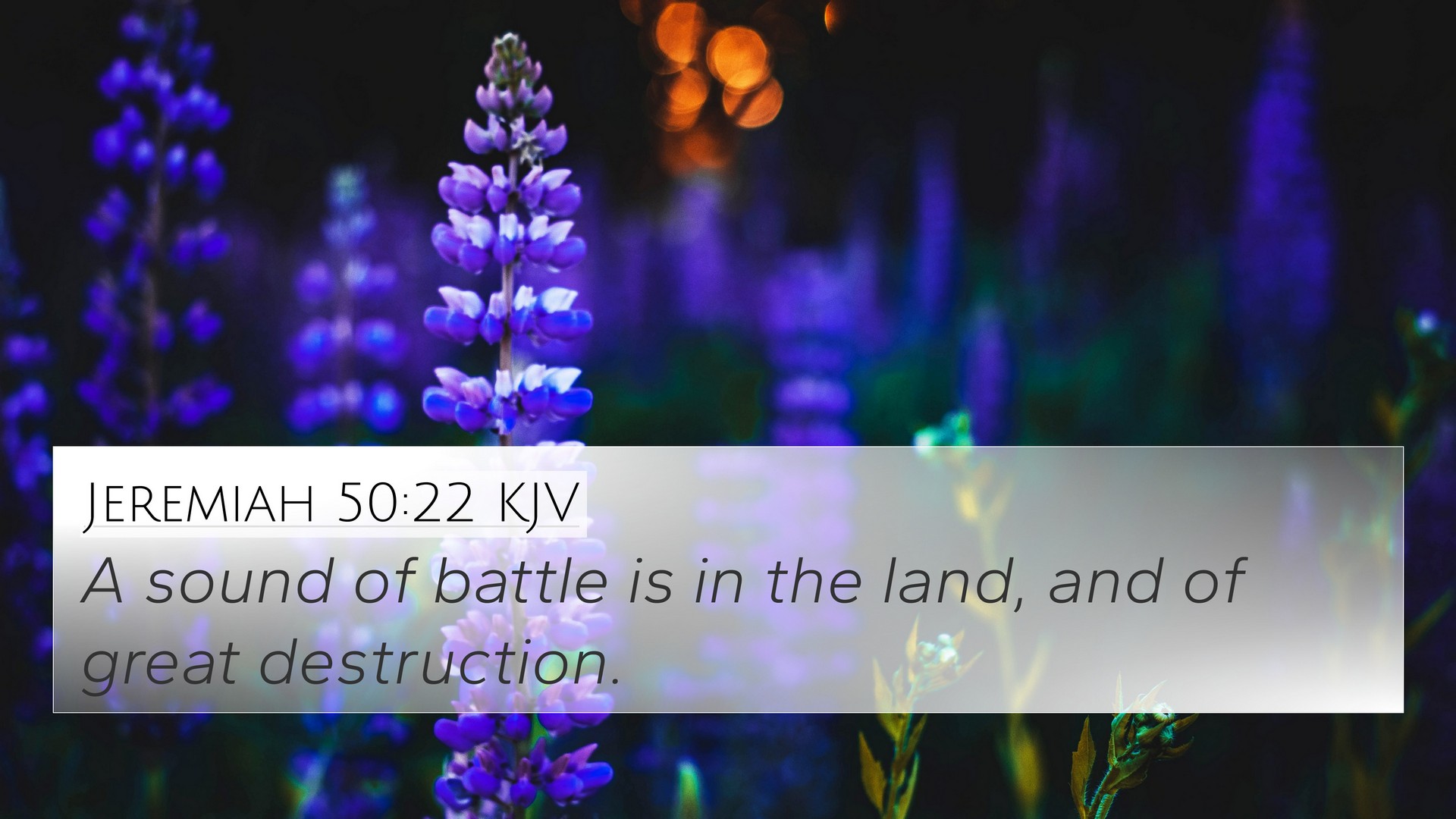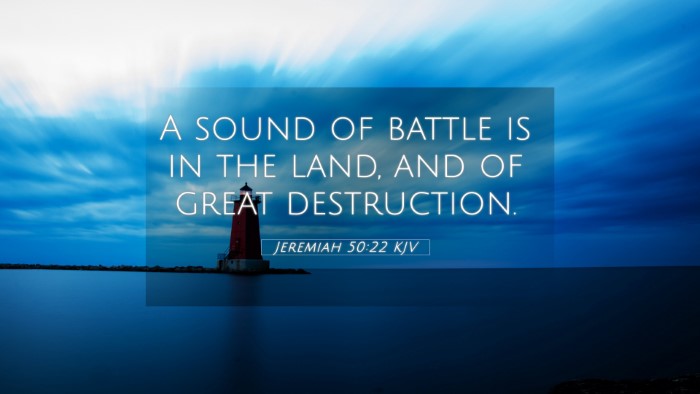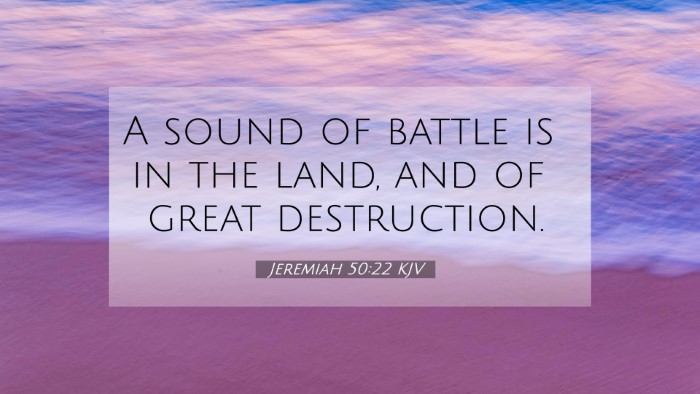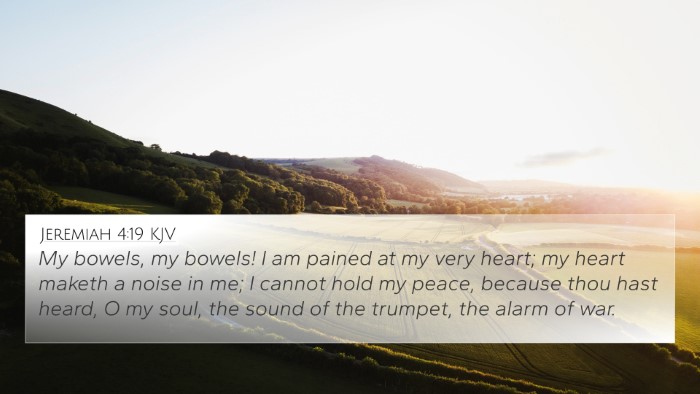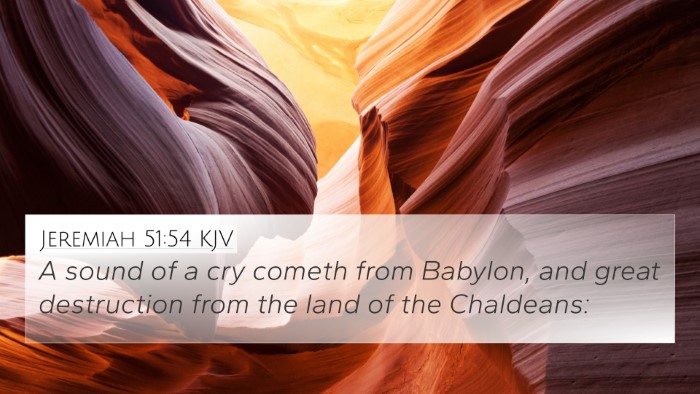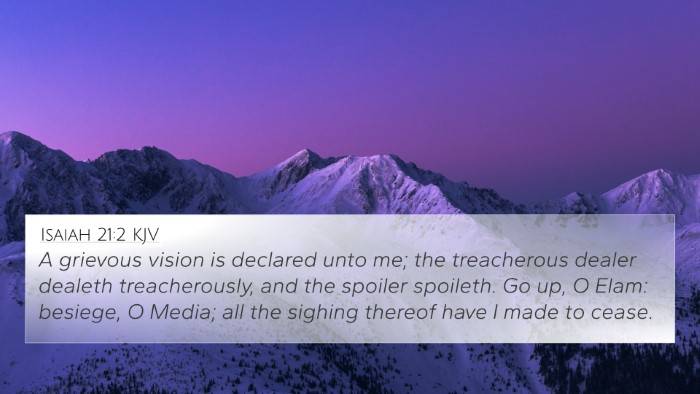Understanding Jeremiah 50:22
Verse: "A sound of battle is in the land, and of great destruction."
The verse from Jeremiah 50:22 is a part of a larger prophecy against Babylon, illustrating the impending judgment that God has pronounced over the city and its inhabitants. This verse emphasizes the chaos and destruction that is to come as a result of God's wrath against Babylon for their oppression of Israel and their arrogance.
Summary of Interpretations
This verse reflects the theme of divine retribution, a common thread throughout the prophetic books of the Old Testament. Below, we outline insights from notable public domain commentaries, providing a comprehensive understanding.
Matthew Henry's Commentary
According to Matthew Henry, this verse signifies the serious and dreadful nature of the judgment that God has decreed against Babylon. Henry elaborates on the "sound of battle" as indicative of turmoil and violent conflict, representing not only physical destruction but also spiritual desolation. He emphasizes that this prophecy serves as a warning to all who oppose God’s will.
Albert Barnes' Notes
Albert Barnes interprets the phrase "sound of battle" as a metaphor for the calamities that befall cities when they face divine judgment. He highlights that this sound signifies a reality where God's vengeance will be unleashed, leading to the downfall of Babylon. Barnes also connects this prophetic statement to the historical events of Babylon’s conquest, showcasing the fulfillment of divine prophecy through historical occurrences.
Adam Clarke's Commentary
Adam Clarke provides insight into the historical context surrounding Jeremiah's prophecy. Clarke notes that the "great destruction" mentioned is directly related to the Babylonian empire's practices of idolatry and injustice. He stresses that the reference to battle conveys the idea that God is using nations as instruments of His judgment and that the destruction is inevitable due to the nation's sins.
Thematic Connections and Cross-Referencing
The themes presented in Jeremiah 50:22 can be cross-referenced with various scriptures that reflect on God’s judgment, the sound of battle, and the consequences of sin. Here are some related Bible verses that provide further insight:
- Isaiah 13:4: "The noise of a multitude in the mountains, like as of a great people; a tumultuous noise of the kingdoms of nations gathered together: the Lord of hosts mustereth the host of the battle." This verse depicts God gathering the nations for battle, paralleling the sentiments expressed in Jeremiah.
- Jeremiah 25:30: "Therefore prophesy thou against them all these words, and say unto them, The Lord shall roar from on high, and utter his voice from his holy habitation; he shall mightily roar upon his habitation; he shall give a shout, as they that tread the grapes, against all the inhabitants of the earth." This verse continues the theme of divine judgment and the sound of God's voice bringing about destruction.
- Revelation 18:2: "And he cried mightily with a strong voice, saying, Babylon the great is fallen, is fallen, and is become the habitation of devils, and the hold of every foul spirit." This parallels the ultimate fall of Babylon, capturing the finality of God’s judgment.
- Ezekiel 21:28: "And thou, son of man, prophesy and say, Thus saith the Lord God concerning the Ammonites, and concerning their reproach; even say thou, The sword, the sword is drawn: for the slaughter it is furbished, to consume because of the glittering." This verse reflects the concept of warfare and destruction that aligns with Jeremiah’s message.
- Joel 3:9: "Proclaim ye this among the Gentiles; Prepare war, wake up the mighty men, let all the men of war draw near; let them come up." A call to arms echoed throughout prophetic literature, showing the urgency of God's impending judgment.
- Amos 1:3: "Thus saith the Lord; For three transgressions of Damascus, and for four, I will not turn away the punishment thereof; because they have threshed Gilead with threshing instruments of iron." The theme of inescapable judgment parallels that in Jeremiah 50:22.
- Micah 3:12: "Therefore shall Zion for your sake be plowed as a field, and Jerusalem shall become heaps, and the mountain of the house as the high places of the forest." Referring to destruction brought upon cities due to corruption and sin.
- Proverbs 1:27: "When your fear cometh as desolation, and your destruction cometh as a whirlwind; when distress and anguish cometh upon you." The metaphor of coming destruction echoes the sentiments found in Jeremiah.
- Matthew 24:6: "And ye shall hear of wars and rumors of wars: see that ye be not troubled: for all these things must come to pass, but the end is not yet." Reflects on the perennial nature of warfare and destruction in the prophetic tradition.
Tools for Bible Cross-Referencing
Utilizing tools for Bible cross-referencing can greatly enhance our understanding of scripture. Below are some methods and resources:
- Bible Concordance: A comprehensive index of the words found in the Bible along with their locations helps in locating verses quickly.
- Bible Cross-Reference Guide: These guides provide direct links between related scriptures, aiding in deeper studies.
- Cross-Reference Bible Study: Engaging in study that deliberately seeks out connections between verses.
- Bible Reference Resources: Tools that provide summaries and explanations of verses surrounding key themes.
- Comprehensive Bible Cross-Reference Materials: Books and online resources dedicated to linking scriptures across both Testaments.
Conclusion
Jeremiah 50:22 serves as a potent reminder of the consequences of disobedience to God and the reality of judgment present throughout the Biblical narrative. Through understanding this verse and its related scriptures, one can gain insightful perspectives on God's character and His dealings with humanity. Connecting these themes through various cross-references allows for a richer and deeper study of the Bible.
